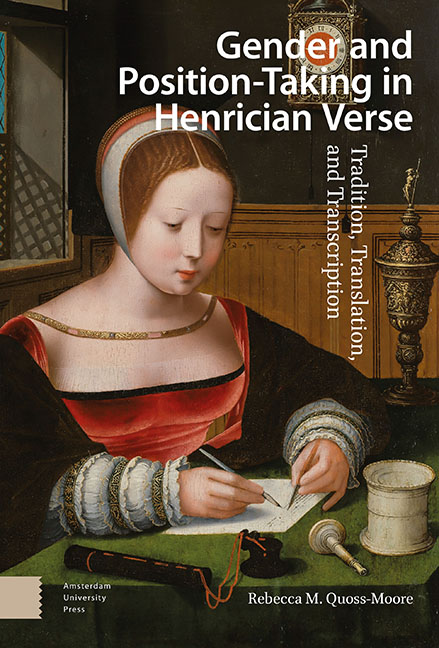Book contents
- Frontmatter
- Table of Contents
- Acknowledgements
- Introduction
- 1 Early Verse Position-Taking in the Henrician Court
- 2 Traditions of Resistance and Verse Position-Taking
- 3 Translation and the Position-Taking Verse Tradition
- 4 Men’s and Women’s Approaches to Translation and Authority in the Late Henrician Court
- 5 Transcription as Translation: Writing the Language of Manuscript Poetry
- 6 Resistance and Unity in the Douglas-Howard Exchange
- Conclusion
- Bibliography
- Index
Introduction
Published online by Cambridge University Press: 13 February 2024
- Frontmatter
- Table of Contents
- Acknowledgements
- Introduction
- 1 Early Verse Position-Taking in the Henrician Court
- 2 Traditions of Resistance and Verse Position-Taking
- 3 Translation and the Position-Taking Verse Tradition
- 4 Men’s and Women’s Approaches to Translation and Authority in the Late Henrician Court
- 5 Transcription as Translation: Writing the Language of Manuscript Poetry
- 6 Resistance and Unity in the Douglas-Howard Exchange
- Conclusion
- Bibliography
- Index
Summary
Abstract: This introduction outlines the core goals of the project, which returns to the Henrician texts that underpinned much New Historicist work and re-reads these through the intervening scholarship on women’s writing, manuscript and print cultures, and revisions and challenges to that New Historicist framework. The project re-reads women into the Henrician canon to further illuminate the forces of canon formation that contributed to those women’s erasure and to restore more accurate depictions of a shared social system of verse position-taking. This restoration enables an exploration of how collections like Tottel’s—and their later influence—contributed to a misapprehension of single authorship, an initial diminution of Henrician verse’s political significance, and a damagingly inaccurate masculinizing of literary history.
Keywords: Henrician translation; early modern women’s writing; Tudor verse transcription; Devonshire Manuscript; gendered canon formation; courtly love lyric
1536 was something of a landmark year for political scandal in England even considering the tumultuous history of the court of Henry VIII. One queen lost her head, another took her place, and Henry Fitzroy, the King’s only acknowledged son, died suddenly, within months of setting up house with his new wife. This context was nearly fatal for Margaret Douglas, niece to Henry VIII, who chose a particularly ill-omened time to contract an unapproved marriage to another of the King’s relatives, Thomas Howard. Given the unstable state of the dynasty, Henry reacted viciously to his niece’s transgression, imprisoning both Douglas and Howard. Howard fell under an act of attainder that simultaneously established as treason the act of which he was accused: marriage to a member of the King’s family without the King’s consent. Though contemporary observers suspected that the King intended clemency, his intentions were mooted by Howard’s death in the Tower from ague.
Certainly, the outline of events has all the elements of a storybook tragedy: young lovers imprisoned by an embittered king who twists the law to suit his temper. What sets this tragedy apart, though, is the role these particular young lovers had in the production of poetry at court. Douglas and Howard were major contributors to, if not the creators of, the Devonshire Manuscript.
- Type
- Chapter
- Information
- Gender and Position-Taking in Henrician VerseTradition, Translation, and Transcription, pp. 9 - 28Publisher: Amsterdam University PressPrint publication year: 2023



